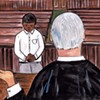Published December 20, 2006 at 5:00 p.m.
I heard Reverend Billy preach the other night at Manhattan's Cooper Union. His red-hot, red-robed Church of Stop Shopping Gospel Choir and Not Buying It Band rocked the Great Hall to its vaulted ceilings, mingling with the echoes of rabble-rousers past, from Fredrick Douglas to Emma Goldman to Hugo Chavez. The evening was entitled "Save Christmas from the Shopocalypse."
As always, the Reverend (a.k.a. performance artist Bill Talen) exorcised the demons from a member of the audience (a.k.a. "congregation"). Laying his hand on her head, he peeked into her sweater collar at the "Made in China" tag and was propelled backwards by the force of the Devil Consumerism exiting her body. The choir swayed. "Back away from Wal-Mart," they sang, "Back away!" And "Are you my lover? Are you my logo?"
The faux-yet-real preacher danced and shouted his sermon, excoriating the evils of globalization, worker exploitation and the seduction of the Product while evangelizing the gospel of community, justice and peace. At the back of the hall, a table was piled with the gifts we'd been asked to bring "to give a stranger" - and "recreate the gift economy."
All the sweat and swelling voices onstage, however, could barely draw an "Amen" from the crowd. They sat, like Lutherans in eastern South Dakota, nodding their heads, laughing, but barely moving. Then, to the tremolos of the keyboard and the hallelujahs of the choir, Billy "sainted" three organizers from Retail Action Project, or RAP, a campaign for fair wages and working conditions in the Lower East Side's chain stores. The crowd rose to its feet and cheered. Not for nothing are the Reverend and his entourage invited to heat up rallies wherever unions and communities are being organized to hold back the big-box bulldozers.
This one break from quietude was a clue to Billy's problem, though - that is, the problem of the anti-consumerist movement. RAP is a campaign to do something: organize workers and, that evening, gather the multitudes to march with them the following Sunday. The RAP folks were passionate, their cause righteous. It felt good to get behind them.
Anti-consumerism, by contrast, is a campaign to not do something - shop - something that, if we're honest about it, feels pretty good, too. This inaction is particularly difficult at holiday time (unsurprisingly, it's Billy's busiest season), but not buying is close to impossible at any time of year. That's what I discovered during the year my partner Paul and I bought nothing but "necessities" - food ingredients, Internet access, insulin for our diabetic cat. I wrote about the experience in my book Not Buying It: My Year Without Shopping.
No question, Paul and I reaped all the rewards of non-consuming - from hours of free, fluid time to weight lost and debts dissolved. To boot, we did our bit for the environment. Still, I learned, without the exchange of goods and services, civilizations would not exist. In a money economy, that exchange involves cash and plastic. So never mind procuring the calories to keep the body warm or the roof to keep it dry; without purchasing, you can't have a cultural life, a social life, a political life, or even an identity, which is communicated by the clothes we wear, the movies we see, the furniture we put in our homes. If we're all socially constructed, in capitalism we are commercially constructed.
The gift table at the Great Hall was a case in point. Only one item was homegrown: a dozen potatoes, the soil still on them, in a paper bag. Some gifts were recycled - a used "Doonesbury" book, a 2005 Labor History Month poster - but even these were once bought. Attracted by its newspaper wrapping, I picked up what turned out to be a box of TNT Pop-Its noisemakers, manufactured in You-Know-Where. Paul and I brought a pineapple. Nicely uncommercial? Well, the fruit was purchased at the supermarket, and no doubt grown in a pesticide-soaked field owned by a multinational and tended by underpaid workers.
The preacher and I have discussed this dilemma. (Full disclosure: We did a scene together for Morgan Spurlock's upcoming documentary, Shopocalypse, and Bill enthusiastically reviewed Not Buying It.) We agreed that the best you can be about shopping is conscious and moderate: Buy local, buy union, buy green, and, when possible, recycle, repair, reuse, and resist the pitch.
Still, tongue in cheek or not (this ambiguity is part of Bill's genius), the Church of Stop Shopping mobilizes not just desire for all that good stuff - community, etc. - but also guilt about our desire for the "bad" stuff. The preacher even describes the Product as evincing an erotic thrill in the consumer. Back away! sings the choir. The implication is, from sin.
So here's where I part ways with the good Reverend. Especially this month, I say, forget sin. Yes, these are holy days - but they're not days of atonement. I'm not advising anyone to purchase a $1500 flat-screen TV for every adult on the list, or for each kid a pile of plastic crap destined for the landfill. By all means, bake cookies for Aunt Sarah, knit a scarf for your girlfriend.
But holidays are feasts, and feasts are rituals of gluttony, which, last time I checked, was one of the Seven Deadlies. At Christmas, Chanukah or Kwanzaa, the thing to do is overdo it.
We eat fat. Christians gorge on buttery cookies and eggnog, ham and goose. Jews consume latkes, fritters and schnitzel, oily foods to commemorate the miracle of the long-burning oil in the victory of the Macca- bean fighters. Kwanzaa celebrants fry coconut-coated chicken and bake coconut cream pies. But the midwinter rites, in anticipation of the cold, dark days, are older than all that. They may not even be species-specific. Polar bears devour a blubbery walrus before crawling into hibernation.
Accordingly, every year, including our Year Without Shopping, Paul and I throw a massive Chanukah Latke Bash. We shop and clean for two days, rise at 6, fry 20 dozen potato pancakes, and scatter the table with bowls of sour cream and a small school of smoked fish - $15 per pound of fatty flesh and skinny bones from Russ & Daughters, New York's "Louvre of Lox," as the Times of London called it.
Our Bash is a ritual like those in the gift economies Reverend Billy wanted us to emulate at the Great Hall - societies where diplomacy is conducted and power established or overturned by the passing of symbolic objects from person to person and tribe to tribe. Gift rituals, like the Native American potlatch, are orgies of extravagance. Animal or human captives are sacrificed, gifts too numerous to count are spread before the guests; sometimes, to demonstrate the profligacy of the giver, they are smashed or burnt or thrown into the sea. By the time it's all over, food, table, house or village may lie in ruins.
To the philosopher Georges Bataille, this devastation is not the unfortunate consequence of a celebration gone overboard, à la fraternity party. Devastation is the point. "It is not necessity but its contrary, 'luxury,' that presents living matter and mankind with their fundamental problems," Bataille wrote in The Accursed Share. Classical economists are wrong, he argued, that consumption is a "productive expenditure" in service of a human drive toward accumulation. Quite the contrary, said Bataille: Consumption is, literally, about using up, compelled by the need to annihilate the excess energy that is around and in us, from the sun to the libido. No matter how materially poor a society, it is driven to "squander," through gifts and feasts, sex, art and war.
The Latke Bash aspires to such grand-scale squandering. It is a single-minded event; meeting and greeting are secondary. Arriving around 4, our guests throw off their coats, move straight to the table, load their plates, and gorge until a stupor descends on the room.
Where getting and having are concerned, enough is significantly less than we, and Americans generally, think it is. But, as Blake wrote, "You never know what is enough unless you know what is more than enough." In giving and celebrating, too much is just enough.
EMAIL THE AUTHOR // LETTER TO THE EDITOR
More By This Author
Speaking of Politics
-

Bernie Sanders Sits Down With 'Seven Days' to Talk About Aging Vermont
Apr 3, 2024 -

Al Franken Blends Satire and Political Commentary at Flynn Show
Sep 19, 2022 -

Candidates for Governor Display Stark Differences at Tunbridge Fair Debate
Sep 16, 2022 -

Weinberger Removes Racial Equity Director From Oversight of Policing Study
Mar 16, 2021 -

Sirotkin Criticizes Grant Program — to a Larger Audience Than He Intended
Feb 24, 2021 - More »
Comments
Comments are closed.
From 2014-2020, Seven Days allowed readers to comment on all stories posted on our website. While we've appreciated the suggestions and insights, right now Seven Days is prioritizing our core mission — producing high-quality, responsible local journalism — over moderating online debates between readers.
To criticize, correct or praise our reporting, please send us a letter to the editor or send us a tip. We’ll check it out and report the results.
Online comments may return when we have better tech tools for managing them. Thanks for reading.













































